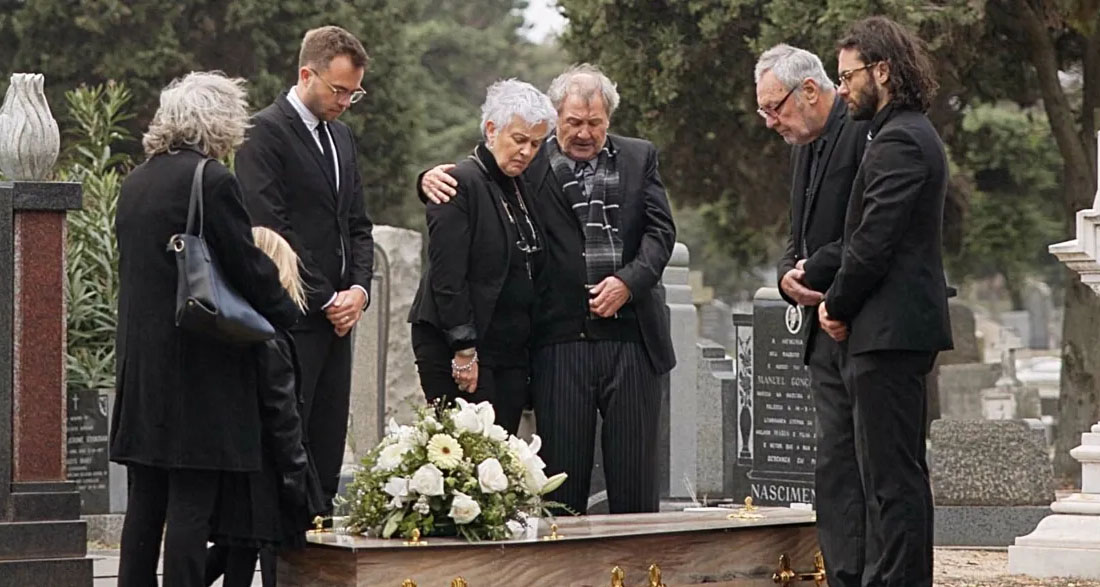Have you ever felt like someone tried to erase you from your own story? Like they were saying the love you gave, the life you lived, didn’t count?
That’s exactly what my brother did. He acted like I didn’t belong—like I wasn’t family enough to say goodbye to the woman who raised me. To our mother.
The house is so quiet now. Too quiet. I walk through the rooms, still catching the soft scent of her lavender hand cream in the air. It’s in the couch cushions, the blankets, even the towels in the linen closet. I half expect to hear her voice from the kitchen, calling, “Emily, come taste this soup—I think I put too much garlic!”
But there’s only silence.
It’s been two weeks since she passed. Ovarian cancer. Stage three. And every day, the hole in my chest gets bigger, deeper. Like the grief is carving out pieces of me.
My phone rings, and I already know who it is.
“Emily, honey, are you eating?” It’s Aunt Susan. She calls every day—sometimes twice. “Your mother would want you to take care of yourself, sweetheart.”
I barely whisper, “Yeah.” But the fridge is full of untouched casseroles from sweet neighbors trying to help. I just… can’t eat. Food tastes like cardboard now. Like nothing.
Mom was everything to me. And not just because she loved me—but because she chose me.
I was five when she and Dad adopted me. A small girl with a ragged pink backpack and eyes that didn’t trust anyone. Not yet.
They already had Mark—Mom and Dad’s biological son. He was eight then. He had her dimples and Dad’s loud, confident laugh. He ran faster, spoke louder, always seemed like he belonged in every room.
I remember the first day clearly. I was clinging to the banister, nervous and quiet, when she bent down, put a warm hand on my shoulder and said, “This is your big brother, Mark. And this… this is your sister.”
That night, when I couldn’t sleep, she came into my room, brushed my hair back and whispered, “This is your forever home now.”
She meant it. Every word. She lived those words.
Dad was amazing too. He taught me how to ride a bike, ran beside me as I wobbled down the sidewalk, shouting, “Keep going! I’m right here!” He gave me piggyback rides until his back gave out.
But when he died—suddenly, from a heart attack—I was thirteen, and everything changed. Mom became my whole world.
She never missed a dance recital. Always showed up with flowers and tear-filled eyes. She helped me with late-night science projects, burning glue sticks and glitter everywhere. When I was sixteen and my first boyfriend broke my heart, she held me for hours.
“Blood doesn’t make a family,” she used to say. “Love does.”
We were close. So close. I didn’t want to be far from her after college, so I found a design job just twenty minutes away. I’d stop by on Fridays with lattes. We had Sunday brunch traditions. Movie marathons in pajamas. We laughed until we cried over terrible holiday baking shows.
Then… everything changed again.
The diagnosis came like a storm.
Ovarian cancer. Stage three.
We sat in the cold hospital room while the doctor talked in soft, careful words. His eyes didn’t meet ours. It was already clear—he didn’t expect her to win this fight.
“We’ll fight this,” I told her that day, holding her hand tightly. “We’ll fight this together.”
And we did. For two long years.
Two years of chemotherapy, of nurses who tried to be kind, of medications that dulled her but never dimmed her love. I moved into her home. Cooked flavorless meals that wouldn’t upset her stomach. Held her hand when she vomited. Helped her into the bath when she was too weak to stand. Slept on the chair next to her bed during hospice.
And Mark?
Mark came twice.
Once on her birthday—with an overpriced bouquet. She smiled through her pain meds and whispered, “It’s good to see him.”
The second time was when she moved to hospice. He stayed for five minutes, gave her a hug, then said, “I can’t handle seeing her like this,” and left.
He lived three hours away in Chicago. Big job in finance. Fancy house. Wife and two kids that Mom barely knew.
But distance wasn’t the reason.
He didn’t come because he didn’t want to. It was easier not to face it.
I never threw it in his face. And neither did Mom.
“Everyone grieves differently,” she’d say, her voice trembling with sadness when he cancelled another visit. “Mark just needs time.”
But time was exactly what she didn’t have.
The morning of the funeral was cold but bright. The sky was that kind of clear blue Mom loved. Autumn leaves danced in the wind.
I stood in her bathroom, wearing the navy blue dress she had picked out with me months earlier—just in case.
“This one,” she had smiled, “You look so beautiful in this one, honey.”
I clutched the folded pages of my speech in my purse. I had rewritten them dozens of times. It wasn’t just a eulogy. It was a love letter. A thank-you. A goodbye.
Aunt Susan knocked gently on the bedroom door. “Emily? The cars are here. Are you ready, sweetheart?”
No. I would never be ready.
But I nodded.
The church was already filling when we arrived. So many people came. Her book club friends, neighbors, old students, fellow teachers from the elementary school where she taught for 30 years.
I greeted people in a daze. Hugs. Tears. Condolences. My heart felt numb.
Then I saw Mark, standing near the front with his wife Jennifer and their kids.
He looked older. Hollow. We hadn’t talked much in those last weeks—he had left most decisions to me. Cold, short texts. Nothing more.
“Emily,” he said when I walked over. “Uh… the flowers look nice.”
“Mom loved lilies,” I replied softly. “Remember how she planted them along the walkway?”
He looked away. “Yeah.”
Pastor Wilson was about to begin the service when Mark pulled me aside, near the church steps.
His voice was tight, his jaw clenched. “Hey… You should sit this one out.”
I stared at him. “What?”
He glanced around. Then he leaned in and whispered, “No one wants to hear from the adopted one. The speech should come from real family.”
Adopted.
That word hit me like a slap.
He had never said it before. Not even during fights when we were kids. Mom and Dad never allowed that line between us.
We were both their children. Equal. Always.
I wanted to scream. To remind him of all the nights I spent holding her hand. All the meds. All the pain. All the love. While he vanished.
But I saw the set of his jaw. He’d made up his mind. Grief had turned him cruel.
So I nodded.
“Fine,” I whispered. “Whatever you want, Mark.”
He stood at the podium and gave a speech.
It was fine. Safe. A few childhood stories. A mention of how much Mom meant “to all of us.”
Polite applause followed.
I sat in the front pew. Silent tears ran down my face. My speech—our speech—burned inside my purse. Unread.
Then something happened.
A woman I recognized from the hospice—Grace—walked to the front. She held an envelope and handed it to Mark.
“Your mother wanted you to have this,” she said, loud enough for everyone to hear.
Mark looked confused. He opened the envelope. Inside was a pale blue letter—the kind Mom always saved for important things.
His hands shook as he unfolded it.
He cleared his throat, once… then again.
And then he started to read.
“To my children, Mark and Emily. Yes, both of you. Blood makes children related. Love makes you mine.”
A sound escaped my lips—a broken sob.
“Mark, you were my first. My wild child. The one who never stopped running. Emily, you were my answered prayer. The soul who chose to come to me in a different way, but just as deeply.”
The church fell silent.
“Emily, I hope you kept the words I helped you write. Because they’re my last ones, too.”
Mark looked up, eyes full of pain and shame.
He met my gaze.
“Please,” he said, voice cracking. “Come up here. I’m sorry.”
I stood. My legs felt like jelly. The room spun slightly as I walked to the podium.
I opened the folded speech. The one Mom and I had worked on together, in those quiet hospice nights.
And I read it.
I told them about her bravery. Her laughter. Her stubbornness and her soft heart. How she taught kids to read, and remembered their birthdays. How she made the best apple pie—and never told anyone the secret ingredient.
I told them what she taught me: that family isn’t always born. Sometimes, it’s chosen. And chosen family can be even stronger—because it’s rooted in love, not just biology.
When I finished, there were tears. Smiles. Hugs. The exact mix of emotions Mom would’ve wanted.
Later, at the reception, people came up to me nonstop.
“She was so proud of you.”
“She loved you deeply, Emily.”
“She talked about you all the time.”
Mark found me again.
“I was wrong,” he said, really looking at me. “About everything.”
“I know,” I said quietly.
We stood there. Not in awkward silence—but in the kind that leaves room for something new to begin.
“You know,” I added, “She loved you so much. She never stopped hoping you’d come around.”
Tears welled in his eyes. “I should’ve been there. I wasted so much time.”
“Then don’t waste any more,” I said, thinking of something Mom always told me:
It’s never too late to start over.
And I realized something in that moment.
I didn’t need to be at the podium to prove I was her daughter.
She’d already said it louder than anyone else ever could.
And everyone had finally heard it.














